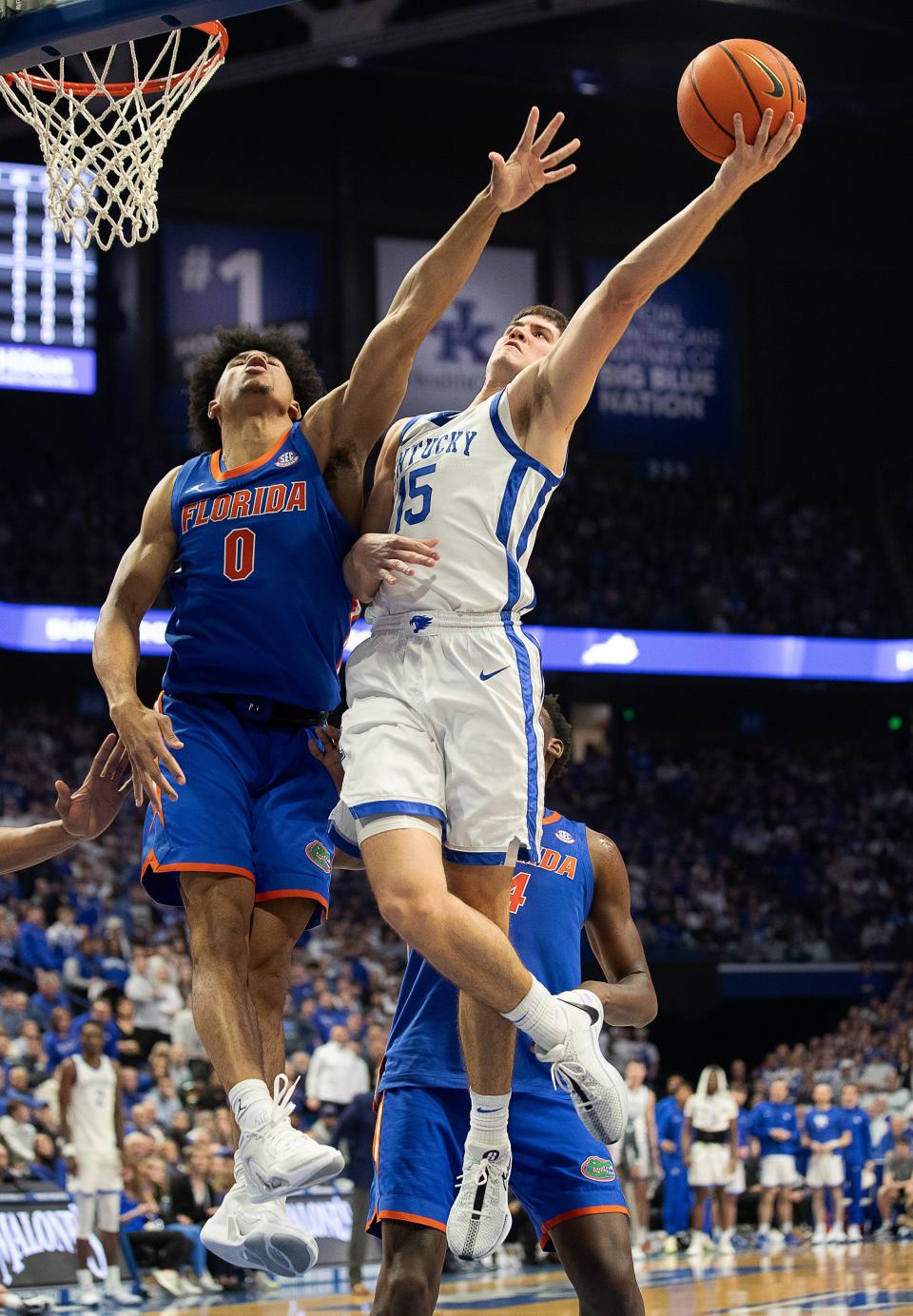Should Kentucky basketball have fouled up 3 on Florida late? What the numbers say
LEXINGTON — Following a close loss in any sport, second-guessing starts as soon as the game ends.
After Wednesday night's 94-91 overtime loss to Florida, a decades-old question surfaced for Kentucky: Should the Wildcats have committed a foul with a three-point lead in the waning moments?
UK chose not to do so. And it was a costly decision for coach John Calipari and his club: Florida guard Walter Clayton Jr. drilled his sixth 3-pointer to tie the ballgame at 84 with three seconds remaining. The Wildcats didn't fire off another shot after the ensuing inbound, and the Gators went on to outscore the hosts, 10-7, in the extra frame to leave Rupp Arena with a victory.
WALTER CLAYTON JR. TIES IT UP FOR THE GATORS 🐊
OVERTIME IN LEXINGTON ⏲️
(via @SECNetwork) pic.twitter.com/F4JyaEO0k8— NCAA March Madness (@MarchMadnessMBB) February 1, 2024
Afterward, Calipari explained why he didn't instruct his players to foul on Florida's final regulation possession.
"There was a little more time (left) than we wanted," said Calipari, as the Gators' possession began with about 13 seconds to play, off a missed free throw by Wildcats freshman Rob Dillingham. "Everything we were doing was to make them shoot some two (pointer). And the kid (Florida guard Zyon Pullin) drove it in the lane — and one of my guys (freshman guard Reed Sheppard) just left his man — and threw it out."
Calipari's counterpart, Todd Golden, understood the dilemma.
"It would have been an opportunity (to foul), probably," said Golden, Florida's second-year coach. "But, honestly, analytically, it’s 50-50 whether you foul or not, and my thing is, we try to be consistent in those opportunities. … They played it out."
Which is the more common strategy.
A study conducted by Nicholas Canova of CBBAnalytics.com, which published in October 2022, reviewed previous analyses assessing whether to foul when leading by three or to rely on defense to get a stop. Canova also pored over data of non-exhibition games between Division I teams in the preceding four seasons. The study specifically focused on "end-of-game scenarios where a team leading by three either allows a three-point attempt, or commits a foul leading to free throws, with under 16 seconds remaining in regulation," Canova wrote.
Though every game unfolds differently, Canova discovered not fouling is the favored approach.
"Our analysis found 1,067 instances of a team allowing a three-point shot when leading by three in the last 16 seconds of a game," he wrote, "and 612 instances of a team fouling."
Most relevant to the Wildcats' loss Wednesday was this finding:
"With 0-4, 4-8 or 8-12 seconds remaining, teams leading by three were more likely to hold on and win in regulation if they fouled," Canova wrote. "Teams that allowed a (3-pointer) to be taken were nearly twice as likely to head to overtime as teams that fouled."
Calipari has multiple components supporting his call, however — which Canova noted. While Canova concluded "fouling appears to be the better strategy," he conceded it's contingent upon a number of factors, including "personnel, where the ball is inbounded, offensive rebounding percentages, free throw shooting, ability to shoot contested 3PAs (and) time remaining in the game."
Two parts of Canova's caveat pertain to Kentucky on Wednesday: its personnel, along with Florida's rebounding prowess.
Because of injuries to freshmen Justin Edwards and D.J. Wagner, the Wildcats had a short bench. (Sheppard played all 45 minutes, while Dillingham, Tre Mitchell, Antonio Reeves and Ugonna Onyenso all were on the floor for 33 minutes or more.) That quintet was on the court for the final 10:25 of regulation. It remained that way until the 2:21 mark of overtime, when Adou Thiero subbed in for Dillingham; less than a minute later, Dillingham returned.
"There was not a whole lot of subs," Calipari said. "It was like, 'Here's what we have.' Adou hurt his back and was giving us whatever he could."
Also backing up Calipari's decision to not foul: The Gators are as good as any team in the country crashing the glass. They entered Wednesday as the top squad in Division I in rebounds per game (44.7) as well as No. 10 nationally in rebound margin.
That extended to offensive rebounding, with Florida owning the country's third-best offensive rebounding percentage (40.3).
"So if we were going to foul with that much time against a really good rebounding team, it’s just dangerous, and I would rather play it out," Calipari said. "And I thought they played it out pretty good."

That was of no solace for Sheppard, who bit on a pump fake on Clayton's game-tying triple.
“It was a good shot. On my end, I can’t do that in a late-game situation like that," he said. "I gotta be locked in and know that they need a 3 to tie it. And I can’t get sucked in like that on the defensive end."
Even if the data suggests fouling is the right move with a three-point advantage in the closing seconds, basketball isn't played on paper. No team has ever lost a hypothetical game. And while analytics can aid the decision-making process, it ultimately comes down to coaches dialing up the right calls and those on the floor making game-winning plays.
Calipari can live with that.
"That’s basketball," he said. "Whatever decision you make, if it works you are a genius. If it doesn’t, (critics say), 'Ah, should have done it the other way.'"
Reach Kentucky men’s basketball and football reporter Ryan Black at rblack@gannett.com and follow him on X at @RyanABlack.
This article originally appeared on Louisville Courier Journal: Kentucky basketball: John Calipari's team loses after not fouling

